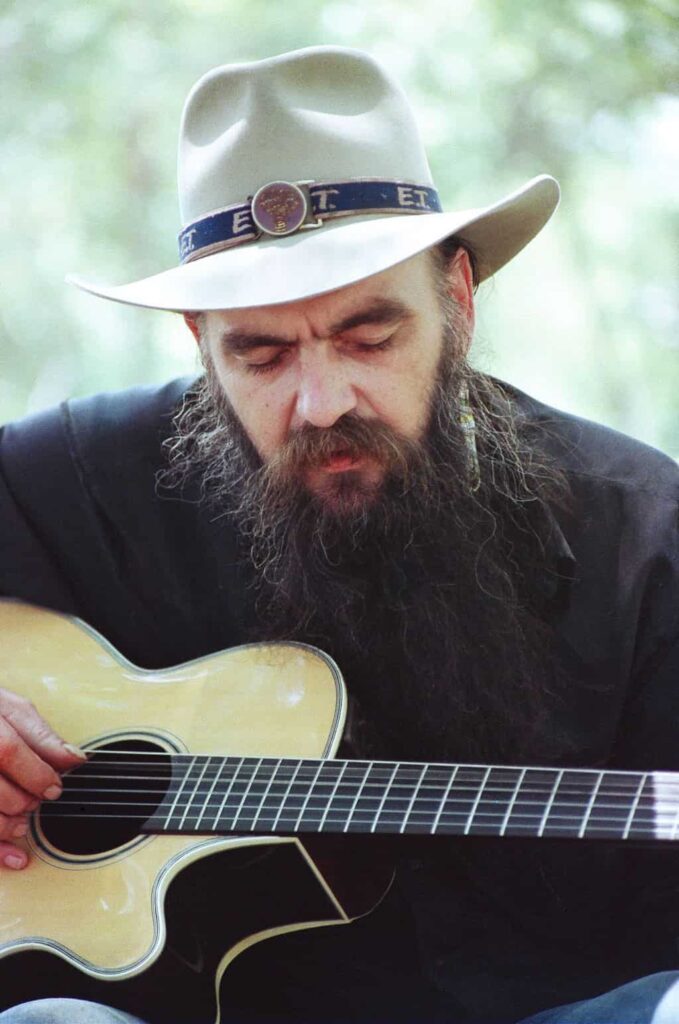
“Clay Pigeons”: A Quiet Anthem of Retreat and Resignation
For those of us who’ve navigated the winding roads of life for a good many years, there are certain songs that resonate not with a booming chorus or a catchy beat, but with a quiet, almost whispered truth. They burrow deep, not because they demand attention, but because they simply are. One such tune, a true diamond in the rough, is Blaze Foley‘s “Clay Pigeons.” It’s a song that speaks to the weary soul, to the desire for solitude, and to the profound acceptance of one’s place in the world, however small or unnoticed that may be.
Released posthumously on his 1989 album, “Live at the Old Quarter,” and gaining wider recognition with the 1999 compilation, “Live at the Austin Outhouse,” “Clay Pigeons” never soared to the top of any mainstream charts in its initial form. This, perhaps, is fitting for a song and an artist so fundamentally outside the commercial machinery of music. Blaze Foley, born Michael David Fuller, was a quintessential outsider artist, a drifter, a poet, and a troubadour whose life was as transient and unvarnished as his music. His chart position, or lack thereof, is less a measure of the song’s impact and more a testament to the fact that some of the most profound art finds its audience through different channels – through word of mouth, through the quiet discovery of those who truly listen.
The story behind “Clay Pigeons” is inextricably linked to Foley’s nomadic and often troubled life. He was a man who lived on the fringes, finding solace in cheap motels, friends’ couches, and the bottom of a bottle. This song, with its yearning for a simple, solitary existence, reflects that deeply. It’s been said that Foley wrote “Clay Pigeons” during a period of introspection, perhaps after one of his many stints living rough or battling his personal demons. The lyrics paint a vivid picture of a man longing to escape the hustle and bustle, to “watch the seasons change” and “just let the days go by.” It’s a fantasy of quietude, a gentle renunciation of the grand ambitions and frantic pace that often define our younger years.
For those of us who remember a time before constant connectivity, before the relentless noise of the digital age, “Clay Pigeons” evokes a powerful sense of nostalgia. It takes us back to a simpler time, or perhaps, to a simpler desire for time. We’ve all felt it, haven’t we? That pull to step away from the fray, to find a quiet corner where the only demands are those of nature and the gentle rhythm of our own breath. The “clay pigeons” themselves are a beautiful, poignant metaphor. They are targets, yes, but targets that are easily shattered, ephemeral. They represent the fleeting nature of worldly pursuits, the small, inconsequential things we chase, while the real desire lies in the quiet observation of life’s passing.
The meaning of “Clay Pigeons” is multifaceted, yet at its heart, it’s a deeply personal rumination on contentment and surrender. It’s not a song of giving up, but rather a song of giving in – to the flow of life, to the inevitability of time, and to the beauty found in stillness. It’s about finding peace in the mundane, in the simple act of existing without grand purpose or external validation. For older readers, this resonates deeply. We’ve seen enough seasons change to understand the wisdom in knowing when to chase and when to simply observe. We’ve learned that true richness often lies not in what we acquire, but in what we let go.
The song’s quiet, almost melancholic melody, coupled with Foley’s unpolished, deeply authentic vocal delivery, makes it feel less like a performance and more like a whispered confession. There’s a raw vulnerability to it that bypasses the intellect and goes straight for the heart. It reminds us of hushed conversations on porch swings, of solitary moments gazing out at a changing landscape. It’s a song that doesn’t demand your attention; it invites you to listen, to reflect, and to find a piece of your own quiet truth within its gentle verses. And in a world that constantly screams for our attention, the quiet voice of Blaze Foley continues to echo, a timeless reminder of the profound beauty in simply being.